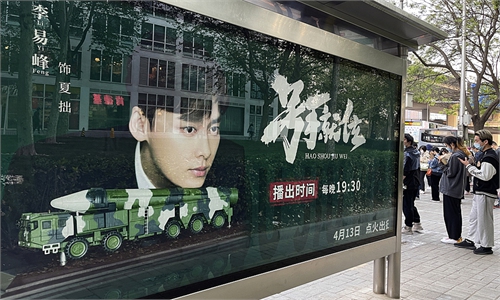ARTS / TV
New drama from Chinese director Feng Xiaogang criticized for forgetting the 'common woman'

Wang Luodan in TV drama Crossroad Bistro Photo: Sina Weibo
Crossroad Bistro, a new TV drama directed by one of China's most well-known film directors Feng Xiaogang, hit Chinese streaming platforms on Sunday. As the new show marks a return for Feng to TV after an absence of more than 25 years, it captured the attention of netizens. However, the first nine episodes have also garnered a fair share of criticism from netizens who say they find the show's characters unrelatable as they are rich people living "ivory tower" lives.The 12-episode series tells the story of five women in Beijing who try to start a restaurant business together. Each of the characters has been given a unique personality and background that is supposed to portray the independence and diverse pursuits of today's Chinese women living in big urban centers.
Feng's reputation as a skilled director was no doubt a major reason that the show became a hot topic on China's Twitter-like Sina Weibo, earning more than 100 million views in just a few days.
However, looking at the social media reaction, it seems the show's characters have not received a warm welcome from viewers.
Many netizens said they were uncomfortable with the design of the show's characters, since they are depicted as "idealized" and "sophisticated" women living in "ivory towers" and as such are incapable of depicting the majority of Chinese women.
"I don't mind that these girls live in an ivory tower but are still pursuing a better life. But, I just find it very uncomfortable that the show is trying to push the tone that they are trying their hardest to "struggle" for a better life. How can they be trying their hardest if they are already rich and have social resources? Clearly, the show cannot represent all women whatsoever," Mengjie, a TV drama fan in Beijing, told the Global Times on Wednesday.
"As someone coming from a small town in Sichuan who has lived in Beijing for nearly seven years, thinking about everything these characters have as they 'struggle' - a Beijing hukou, knowing the right people or having a high-profile boyfriend - they are not only unrelatable, they don't know how hard life really is, which makes me feel sad," Wang Zhen, another TV watcher, told the Global Times, on Wednesday.
Beside discussions about the characters' relatableness, there are also netizens who expressed anger about how narrowly the spirit of urban Chinese women is represented in the show.
"I'm fed up with these narratives that always depict women who live in the big city as sophisticated, obsessed about success and somehow trapped by romantic relationships. It seems that it has become a general setting in many TV productions, defining big city women as elites. There are different types of ordinary women who are also living in mega cities, that's what I want to say," Chen, a TV fan in Beijing, told the Global Times.
"Feng Xiaogang lost his magic power when it comes to depicting 'ordinary people.' This used to be the biggest charm in his works," posted one netizen on Sina Weibo.
Despite the criticism, a number of viewers commented that Feng's iconic storytelling style still showed through in the drama and expressed that for this reason they would still stick with the drama.
"It isn't just the story; I like the lines and the classic Feng cheekiness that is in the drama. It feels so familiar, like the old TV shows he made more than 20 years ago," another netizen wrote on Sina Weibo.



